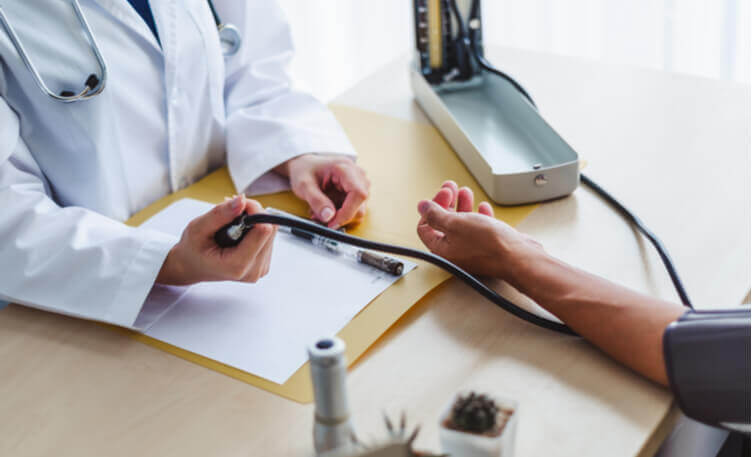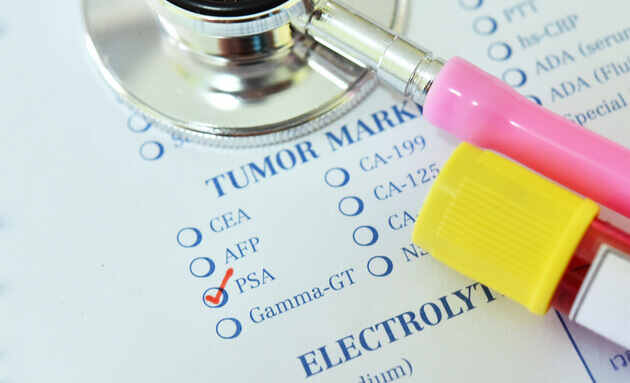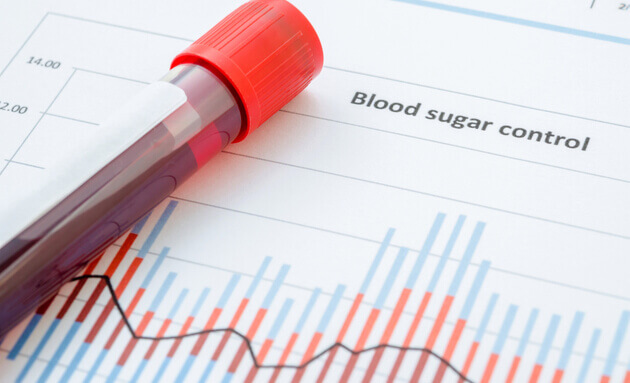6 Crucial Diagnostic Tests For Men Over 50

Turning 50 is a milestone, especially when it comes to your health. That’s why it is imperative for men over 50 years of age to get regular health checkups in order to improve their quality of life. By taking time out to schedule regular health checkups, you and your doctor can detect any underlying problems before they escalate into something serious.
Here are a few diagnostic tests that should be part of any health checkup for men over 50:
-
Prostate Specific Antigen or PSA test

Who needs it: Although all men are at a risk for prostate cancer, the risk greatly increases with old age. Men who are 50 years or above are at a higher risk of developing prostate cancer.
Why it’s important: PSA is a protein that is produced by both malignant and benign prostate tissue. This antigen helps to liquefy semen, due to which a small amount of PSA normally enters the bloodstream. Malignant prostate cells produce more PSA than benign cells, causing PSA levels in your blood to rise. Elevated PSA levels may reveal prostate cancer that’s likely to spread to other parts of your body or help to detect quick-growing cancer that’s likely to cause other problems.
How it works: The PSA test is a blood test that is used to measure the amount of PSA in your blood. High PSA levels may indicate prostate cancer or an enlarged or inflamed prostate. Therefore, determining a high PSA reading can sometimes be complicated. One may have to undergo a rectal exam to correctly determine the condition.
When to schedule the next one: PSA levels are measured in nanograms per millilitres. If your PSA levels are 3 ng/mL, your doctor may ask you to get a biopsy of the prostate done. If your levels are less than 1 ng/mL, then your doctor will most likely ask you to get another PSA done at the age of 60. -
Colonoscopy
Who needs it: If you are 50 years or older, your doctor will definitely ask you to undergo a colonoscopy. He or she may ask you to get the test done earlier if you have certain character traits such as Inflammatory Bowel Disorder (IBS) or a family history of colon cancer.
Why it’s important: A colonoscopy allows your doctor to catch cancer or precancerous growths in the colon and rectum region. If necessary, small amounts of tissue or growth of grape-like tumours called polyps may be removed and sent to a lab for a biopsy. This will help determine if there is any presence of malignant cancer cells in the colon or rectum. In many cases, a colonoscopy gives an accurate diagnosis and treatment of colorectal problems without the need to undergo any major operation.
How it works: To have a successful colonoscopy, your bowel must be empty so that your doctor can clearly view the colon. That’s why it is very important to follow all the instructions that your doctor gives you at least 2 weeks before your test. On the day of the screening, you will be given a mild sedative or pain reliever through an IV. During the test, you will have to lie down on your left side, with your knees drawn up towards your chest. The colonoscope is inserted into the rectum and advanced through the large intestine. The entire procedure lasts from 30 minutes to 1 hour.
When to schedule the next one: If your colonoscopy doesn’t show any adenomas or malignant growths and you don’t have the risk factors, the next test will be scheduled in 10 years. If one or two small risk adenomas are removed, the exam can be repeated every 5 to 10 years. Depending on your test results, your doctor will schedule your next visit. -
Blood Pressure Screening

Who needs it: Every adult needs to get their blood pressure checked regularly. For adults over 50 years, high blood pressure or hypertension can be especially dangerous as it increases the risk of developing coronary artery disease that can lead to life-threatening episodes such as heart attack and stroke.
Why it’s important: Hypertension wears down your blood vessels, raises your risk of heart attack, stroke, and some types of dementia. It is often called the silent killer because people suffering from high blood pressure rarely show any signs. That is why early detection and regular diagnostic tests are key to controlling hypertension and the complications that arise from it.
How it works: A blood pressure test is non-invasive and done by using a sphygmomanometer. First, your doctor will wrap a cuff around your arm and inflate it using a pump until the circulation is cut off. A small valve starts deflating the cuff, which restores the blood flow back into the arm. The doctor will measure the blood pressure using a stethoscope, placed over your arm, to hear the sound of blood flowing through the arteries. The first sound of the rushing blood refers to the systolic blood pressure and the second number indicates the diastolic pressure, the blood pressure of your heart at rest. A normal blood pressure (120/80 mm Hg) will read with the systolic number first followed by the diastolic’s pressure.
When to schedule the next one: If your BP is normal, then your doctor will probably check it at your next annual check-up. However, if the top number of your reading is greater than 140 or the bottom number is greater than 90, your doctor will recommend more frequent tests. If you suffer from diabetes, heart disease, kidney problems, or certain other conditions, you may need to have your blood pressure checked more often. -
Lipid Profile or Cholesterol Check
Who needs it: This is a routine test that helps to determine the lipid-protein or cholesterol content in your blood. Every adult over 20 years of age should get a cholesterol check done every 5 years.
Why it’s important: A complete cholesterol test measures four types of lipids, or fats, in your blood. The test is used to determine the total amount of cholesterol in the blood, low-density lipoprotein (LDL) cholesterol, high-density cholesterol (HDL), and triglycerides. Out of these, LDL is considered to be bad cholesterol, too much of which raises your risk of heart attack, stroke, and atherosclerosis. HDL is the good cholesterol, which is required to keep LDL levels in check. Triglycerides are again harmful and are stored as fats in the body’s cells.
A high count of LDL and triglycerides can lead to clogged arteries that may keep your heart from working normally and affects the muscles of the heart as well. It is very important for men over 50 to get a routine lipid profile test done as it can help predict the risk of heart disease and stroke.
How it works: This is a simple blood test, where blood is drawn with the help of a needle from a vein in your arm. Your blood is checked for LDL, HDL, total cholesterol, and triglycerides. Depending on the levels of cholesterol, your doctor will give you a prognosis.
When to schedule the next one: If your cholesterol levels are in the safe zone, you may not need another test for 5 years. However, if your numbers are high your doctor will check your blood more frequently as you try to lower cholesterol through diet, exercise, and other alternatives. -
Blood Sugar Screening

Who needs it: Everyone over 45 should get their blood sugar or glucose checked. Your doctor will ask you to get this test done if you have symptoms of high blood sugar such as unintended weight loss, slow healing, or unusual thirst.
Why it’s important: High blood sugar levels can be a sign of diabetes. Diabetes can be of two types: Type 1 diabetes, where your body doesn’t produce insulin, and Type 2 diabetes, where the body resists insulin. In both cases, diabetes can lead to chronically high blood sugar levels and diabetes-related health complications. These may include vision problems, kidney disorders, and an increased risk of developing coronary heart disease.
How it works: A fasting blood sugar test will be done to detect the sugar levels in your blood. Your doctor will ask you to fast for 8 hours before your blood is drawn for the test. Healthy blood sugar levels should measure between 70 and 100 milligrams for people without diabetes or pre-diabetes. If your test results show high levels of blood sugar, your doctor will ask you to get other tests done to diagnose your condition.
When to schedule the next one: If your blood sugar level is normal, you can go for your next blood sugar test in 3 years. If it’s high, you’ll need to have your blood sugar rechecked sooner and possibly have other tests that will help indicate if you have or are at risk of diabetes. -
Eye Exam
Who needs it: Regular eye exams become more important as you reach your 50s. If you wear glasses or contact lenses, it’s a good idea to test for any deterioration in the quality of your vision by consulting your ophthalmologist. Regular eye exams can also help catch other vision problems that begin to develop at this age.
Why it’s important: Many eye related issues such as cataract, glaucoma, and macular degeneration may not have physical symptoms until they’ve advanced. You should get your eyes checked annually you’ve reached your late 40s. These exams become all the more important if you have high blood pressure, diabetes, or a family history of eye disease.
How it works: Each ophthalmologist or eye doctor has his or her own routine. But most eye exams follow a similar pattern, where the doctor will review your personal and family history to see if you may be at risk for any eye problems. Depending on these factors, your doctor will conduct tests to check for vision, coordination of eye muscles, sensitivity to light, eyelid health, measurement of fluid pressure, and other qualities of the eye.
When to schedule the next one: You should get an eye test done every 2 years or as often as your doctor recommends. If you notice any changes in your vision, get it checked by your doctor as soon as possible.
When you go for your next annual health checkup, your doctor will also ask you to get a few other tests done to determine the proper functioning of key organs of your body. These may include:
- Blood Routine: CBC, ESR
- Urine analysis for infection
- Chest X-Ray
- Kidney profile: Serum Creatinine, Serum Urea, Blood Urea, Serum Uric Acid
- Cardiac risk evaluation: ECG, Stress test






